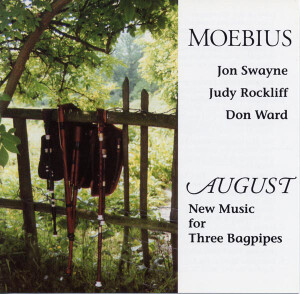 Brendan Foreman wrote this review for Folk Tales.
Brendan Foreman wrote this review for Folk Tales.
I may be wrong here, but it occurs to me that piping music written for six hands, i.e., three pipers, is not the most common music in the world. In fact, most people I know would find this fact very much a good thing. But as Moebius proves here, when it’s done well, this can be great music. Moebius consists of Jon Swayne, Judy Rockliff, and Don Ward, who all play chromatic bagpipes that were designed by Swayne from the Half-long Pipes of Northumberland. Swayne is also the main composer of the music here; Judy Rockliff contributed one tune, “Comme Tu Veux, Tu Choise.”
Although it’s not strictly traditional, much of this music stays within the usual boundaries of Celtic bagpipery. From the first track “Love in the Afternoon – Intermission” to the last “Beverley Recessional,” the CD is filled with the familiar, mostly unison-played, march-like sound of most bagpipe ensembles. Much of this is very good: the sprightly hornpipe/polka set “Allemain – Jake Davey’s Polka,” the very dance-worthy jig and hornpipe of “Cowpie – 1st December,” the waltz set “The Harbinger – Bandoneon.” At other times, though, the music seems to be a tad too slow and a tad too long. The opening track “Love in the Afternoon – Intermission” overstays its welcome by about 3 minutes whereas the jig set “Down the Diaria (Xixon in the Moonlight) – Wholly Innocent” feels more perfunctory than inspired.
The length of many of these tracks is a bit problematic. Often times, instrumental traditional music is played long and repeatedly simply to give the line of dancers a chance to go through the whole cycle at least once and to end where they originally started. But the music here is often much too slow to be danceable, and there is no soloing nor any variations. So the multiple play-throughs of many of these tunes seems a bit mysterious to me.
These problems aside, Moebius do manage to prove that they can break out of their traditional mindsets, creating some very intriguing ensemble work. It is on these tracks, such as “Europipe March No. 1,” which begins as a fairly standard, unison-played march but transforms into something multi-harmonic and syncopated nicely, that they properly utilize all three fully chromatic instrumental voices at their disposal.
“Birdtalk” starts as a simple, somewhat mournful air as played by one piper, but it takes on an otherworldly quality when the other two pipers join in with some fascinating harmonies. “Waiting Game,” a ponderous track of long-played drones, feels almost minimalistic in its simple but striking sense of rhythm. Moebius takes a similar approach to “Overture,” which also gains its magic from a multi-voicing approach. Even a relatively traditional set of music, such as the Breton-esque “Comme Tu Veux, Tu Choise – The Road to Hull – La Prune du Phare,” can feel brand new when given the right harmonies and ensemble playing, as they do here.
The CD ends with “Beverley Recessional,” which oddly enough exhibits both the positive and negative sides of the music of August. The track is a bit overly long with little variation in melody. However, it is a very moving and somewhat sombre march that uses all three of its pipers in a different way: one as melody carrier, another as harmonizer, and the third as the rhythm. There is something incomparably and disturbingly beautiful about multi-voiced bagpipe playing, and it’s magical moments such as these that make me wish that Moebius had concentrated more on the ensemble aspect of their arrangements.
(Rocke Records, 1993)
